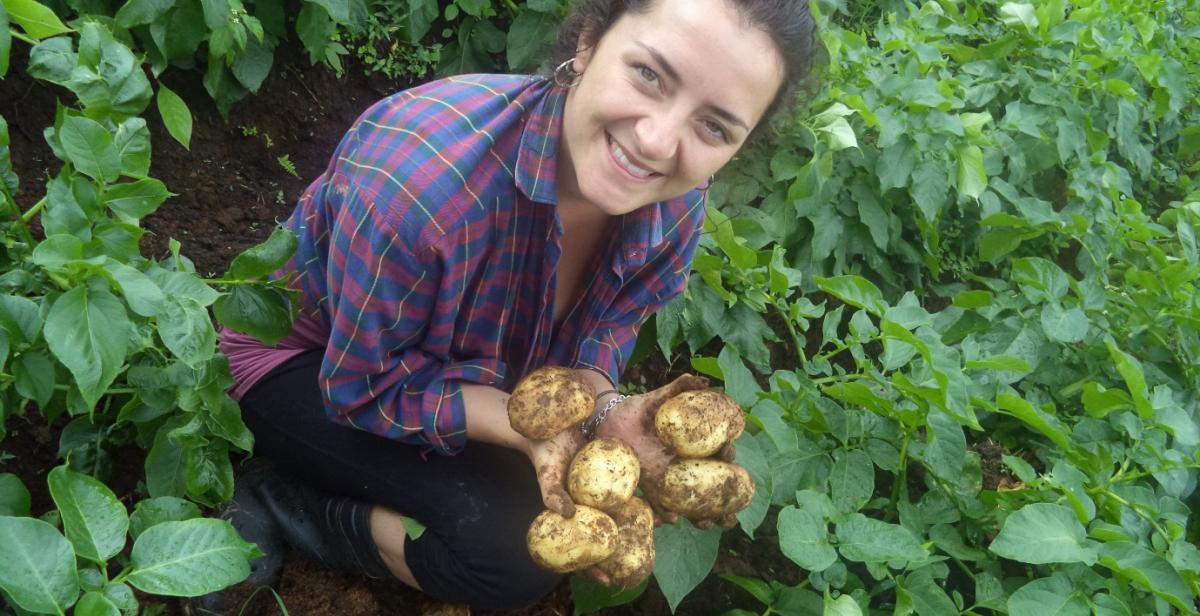On Wednesday morning we left the rest of the group, with our bags packed up for the next couple of days ahead. Fortunately, two of us from the group had been given the opportunity to experience everyday life in the home of an indigenous Lenca family, in the beautiful community of Belen, Manazapa.
We started up the hill which was the first part of our journey in order to get to the homestay. It led us past the uneven football pitch, where we gather every week to practice with the women’s football team; one of the successful initiatives set up in order to empower women in the community. Ducking under the fence, I began to follow the footsteps led out to me by the person we will be staying with. We walk for about ten minutes through muddy clay, over cleverly placed tree trunks acting as bridges - allowing you to pass over the many little water creeks, running down from the mountains and forestry, which surround Belen. I watch him hop from rock to rock, each step seems to land in the perfect place, shaped and moulded just for him. He has a balance and technique which makes me wonder how many times he has made this journey before.
We arrive at the home which is surrounded by fields and trees; a horse is stood grazing, content in its surroundings. We are greeted by some members of the family, two young women and a man, who is unmistakably the head of the family; their huge smiles give us a warm welcome, typical of the Honduran people. Apart from the classic collection of animals you would expect to see on a self-sufficient small holding, we were amused to learn that they also keep pet pigeons. From around the corner came another young girl holding a thin rope with two piglets attached, their faces covered in mud. It was explained they would be kept until they were big enough and then used for a special occasion.
After being shown our bare bedroom with just a small window for light and a double mattress, which looked to have seen the family through many a generation, we make our way to the kitchen which is clearly the heart of the house. We are taught how to prepare tortillas from scratch, a job which seems to take up the majority of the day due to the amount needed for the household. The other volunteer and I watch in awe, as the young mother holds her child on her hip whilst using her spare hand to work the device. We catch each other’s eye silently sharing the realisation of how different this young lady’s life is compared to ours, just one of the many reality checks we would experience during our short stay.

Maize sits ready to be made into tortillas. A staple of the Honduran diet.
We spend the rest of the day weeding the ground where the family grow their crops, which manage to feed them and provide a small income also. With the warmth of the sun on our backs and typical Honduran music to keep us entertained, it was a beautiful sight when we took a moment to lift our heads from the job and look around at the scenery. I began to consider the fact that this is the everyday livelihood of my new found friend, with whom I had been living and working with. Once we had all finished volunteering, he would return back to this simple way of life, where the children of the community gather around his television on a night, because his home is the only one with electricity. He would return back to working his crops, collecting wood, getting by with only the basic necessities. Watching him at work I cherished the moment, feeling honoured to have been invited into his home and shown his way of life.
The homestay in Belen will definitely be one of my favourite memories from my volunteering experience with Progressio ICS. It provided us with a raw insight into the lives of the close knit community, helping us to further understand them. At times it was an eye opener, giving us the opportunity to be able to embrace basic living and realise how we can often take things for granted at home. I believe the fact that we can be seen engaging with community members outside of the workshops, completely immersing ourselves within their culture, and wanting to learn more about their way of life, will inevitably have a positive impact on the relationships we work so hard to strengthen with the communities.
Written by a Progressio ICS volunteer



